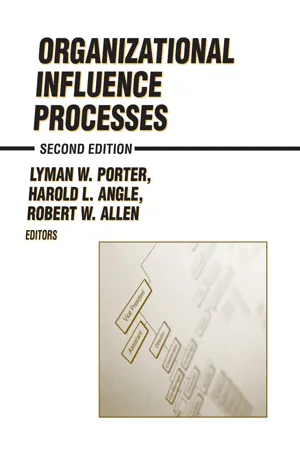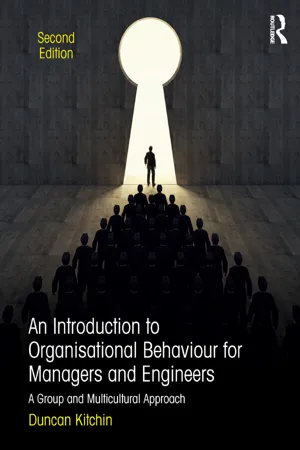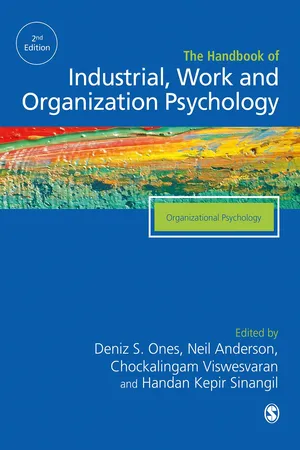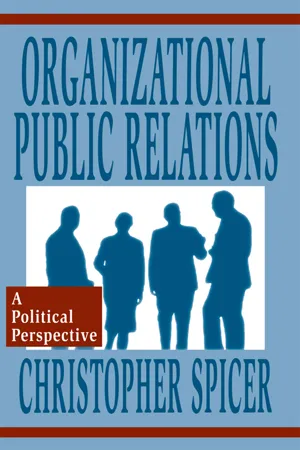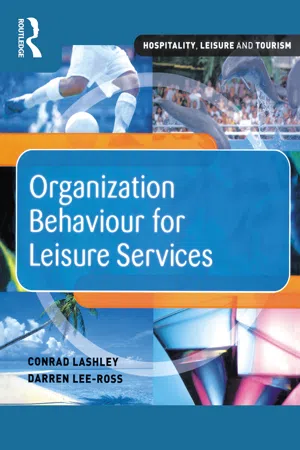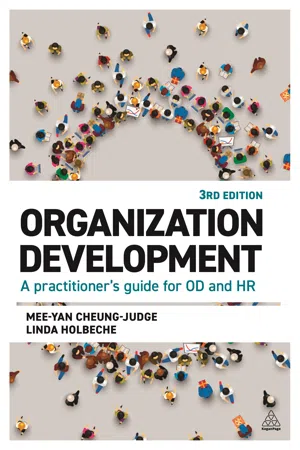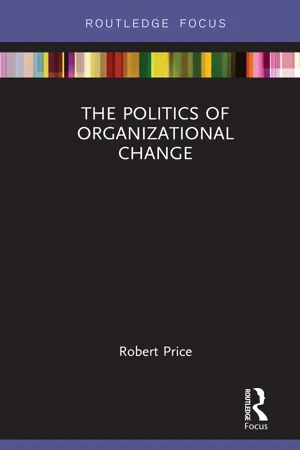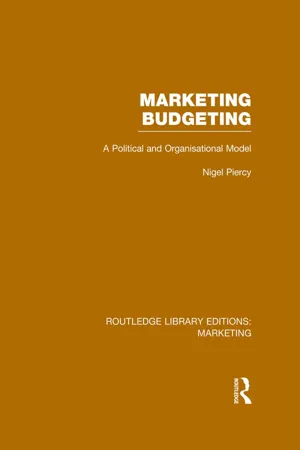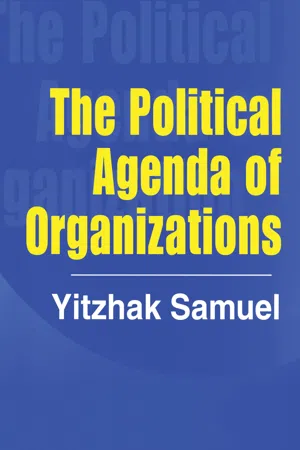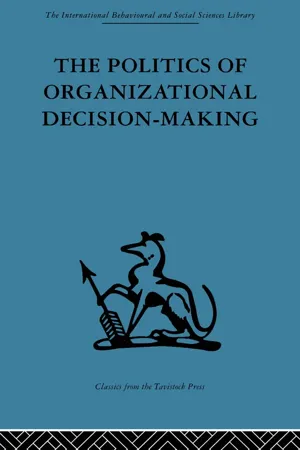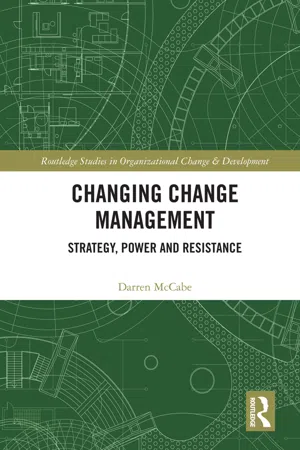Business
Organizational Politics
Organizational politics refers to the informal and often unofficial power dynamics, alliances, and behaviors within a business. It involves individuals or groups using their influence to advance their own interests or agendas, sometimes at the expense of others. Understanding and navigating organizational politics is crucial for success in the workplace.
Written by Perlego with AI-assistance
Related key terms
11 Key excerpts on "Organizational Politics"
- eBook - ePub
- Robert W. Allen, Lyman W. Porter, H.L. Angle(Authors)
- 2016(Publication Date)
- Routledge(Publisher)
An operationally useful definition of organization politics may include elements that Mayes and Allen (1977) called the management of influence. For them, Organizational Politics is a process that involves formulating political goals, decision strategies, and tactics. It entails executing those tactics and setting up feedback loops to ensure effective results. Organizational power politics is also defined in terms of a process of change (Coenen and Hofstra 1988). Defined in this way we can say that Organizational Politics is the essence of leadership.Organizational Politics therefore includes actions taken to gain and use power to control organizational resources to achieve our preferred results instead of those of others. This definition places Organizational Politics in the classroom when a teacher “teaches.” It is in the home as a father asks his child to do something. It is in the office as the subordinate “manages” his or her boss by couching interaction upward in ways calculated to induce the boss to respond favorably. And it is present when the manager orders employees to adopt a new procedure.David Bell emphasizes the “talk” aspect of Organizational Politics (1975). He says traditional definitions of politics as who gets what, when, where, and how is not helpful. Getting control over needed resources can be, and often is, an intensely personal and private (even solitary) affair, not a public one. Talk, on the other hand, always involves others and more consistently conforms to the definition of politics. Talk affects others (Duke 1976), and to that extent it is power. To the widest extent possible, Organizational Politics concerns how people affect each other.Political Behavior
Given our definition of Organizational Politics, it is a commonplace activity in organizations. Research by Madison (1980) and others supports the idea that Organizational Politics is fully a part of organizational life. Sixty percent of managers he surveyed averred that it was “frequently” or “very frequently” a part of organizational life. Most managers see Organizational Politics as a part of work life at the middle and upper management levels and less so at the lower levels. - eBook - ePub
An Introduction to Organisational Behaviour for Managers and Engineers
A Group and Multicultural Approach
- Duncan Kitchin(Author)
- 2017(Publication Date)
- Routledge(Publisher)
There are two broad schools of thought about organisational politics. One approach is to say that politics within organisations are undesirable and tends to lead to chaotic situations within organisations, and to increased stress levels, see for example Fandt and Ferris (1990). The second approach is to say that organisational politics is not only inevitable, but can also be functional rather than dysfunctional, see for example Ammeter et al. (2002) and Huff (1988). Ammeter et al. (2002) said “… politics … [is] … neither inherently good nor bad but rather a fact of life and a feature woven into the very fabric of organisations”. (p. 752).A definition of organisational politics, that has been used for many years, is that of Mintzberg (1983, p. 172) which defines organisational politics as,This definition suggests that politics is about individuals and groups (internal and external), and is an informal part of organisations.… individual or group behaviour that is informal, ostensibly parochial, typically divisive, and above all in a technical sense, illegitimate – sanctified neither by formal authority, accepted ideology, not certified expertise …THE ESSENCE OF ORGANISATIONAL POLITICS
In this chapter we draw extensively, but not wholly, on the approach to organisational politics that is presented by Gareth Morgan in a chapter of his fascinating book Images of Organization (Morgan, 1997).We choose to define organisational political processes as:People in organisations will have differing interests, which inevitably leads to conflicts, and these conflicts are resolved by the exercise of power.… the interaction of interests, conflict and power within organisations.Interests … are … about predispositions, embracing goals, values, desires, expectations and other orientations and inclinations that lead a person to act in one way rather than another.(Morgan, 1997, p. 161)Conflict arises whenever interests collide.(Morgan, 1997, p. 167)Power is the medium through which conflicts of interest are ultimately resolved. Power influences who gets what, when and how.(Morgan, 1997, p. 170)What should already be clear to the reader is that politics are inevitable in organisations. We cannot imagine an organisation where every member of the organisation wanted the same things and agreed about the best way to achieve these things; such an organisation is called a unitary organisation. So, politics is inevitable. We might also ask whether organisational politics is functional, that is, does an organisation function better because there are organisational politics? Later in this chapter, we will argue that organisations that have internal conflicts, and the resulting political processes, will actually function better, and be more successful, than organisations where there are no conflicts. - eBook - ePub
The SAGE Handbook of Industrial, Work & Organizational Psychology
V2: Organizational Psychology
- Deniz S Ones, Neil Anderson, Chockalingam Viswesvaran, Handan Kepir Sinangil, Deniz S Ones, Neil Anderson, Chockalingam Viswesvaran, Handan Kepir Sinangil(Authors)
- 2017(Publication Date)
- SAGE Publications Ltd(Publisher)
Lasswell (1936), the classic political scientist, described politics as ‘who gets what, when, and how'. This is a very succinct description of what organizational researchers are looking to examine in Organizational Politics research. Which individuals or groups in the organization (i.e., who) achieve which goals or outcomes (i.e., what) in what time or context (i.e., when) and through what means (i.e., how)? Broadly, all scholarly work on politics in organizations has endeavored to better describe one or more parts of this question. Although there was some work in the area earlier (e.g., Burns, 1961), research in Organizational Politics began in earnest in the 1970s and 1980s, with several scholars authoring pieces that are still considered foundational works in the area (Mintzberg, 1983; Mintzberg, 1985; Pfeffer, 1981a; Porter, 1976). At this point, research on politics in organizations, which had not been on the radar of many organizational scholars for many years (Porter, Allen, & Angle, 1981), began in earnest.The field of Organizational Politics is broad, incorporating theories and research on power, influence, and politics, and how each of these appear and are executed in organizations (Ferris & Treadway, 2012). Politics has been described as a means by which an individual can use influence tactics and his or her political skill in order to gain power in organizations (e.g., Mintzberg, 1983). Politics as a means to wield power or influence over others has been investigated or articulated in some form since antiquity (e.g., Aristotle, Plato), and in a variety of disciplines (e.g., micro- and macro-organizational research, social psychology, political science). Although, as mentioned above, serious scholarship on politics in the organizational sciences is a relatively recent occurrence, the concept and importance of politics has been as ubiquitous throughout human history as it is today in organizations.Essentially, Organizational Politics represent the means by which individuals in organizations are able to influence one another. These political resources, and the influence they allow, provide individuals who wield them with power in organizations (Pfeffer, 1981a). This political power then can be turned around and used to develop further political power and resources which influence valued outcomes (Salancik & Pfeffer, 1974).Political behavior can take on many forms, all of which are designed and targeted at enhancing the desired outcomes of political actors. These behaviors have been classified under two broad umbrellas in the Organizational Politics literature: Impression management tactics (Jones & Pittman, 1982; Leary & Kowalski, 1990) and influence tactics (Kipnis, Schmidt, & Wilkinson, 1980). The former (i.e., impression management) has been more or less subsumed by the latter (i.e., influence tactics) as the more passive forms of political behavior (e.g., ingratiation). This is in comparison to the tactics at the other end of the range of available influence tactics, which typically are more aggressive and may involve conflict or confrontation. - eBook - ePub
Organizational Public Relations
A Political Perspective
- Christopher Spicer(Author)
- 2013(Publication Date)
- Routledge(Publisher)
Table 6.2 , showing the label describing the category group as well as two representative descriptors from the data.The responses of the public relations practitioners indicated a very astute understanding of the system of Organizational Politics. As one respondent wrote, “Organizational Politics is the assertive interaction of power clusters within an organization that establishes influence priorities among competing coalitions.” Another wrote that Organizational Politics is the “unsanctioned method of communication by which individuals within an organization parlay ideas and alliances into power bases.” These two respondents clearly link Organizational Politics to power, interaction, coalitions among organizational members, and competition for influence. The use of the word “assertive” by the first respondent and “parlay” by the second indicate a pragmatic realization of Mintzberg’s ncessary condition of “will and skill.” - eBook - ePub
- Darren Lee-Ross, Conrad Lashley(Authors)
- 2012(Publication Date)
- Routledge(Publisher)
Another definition is helpful because it suggests that politics is about achieving something effectively and efficiently. In addition, ‘cunning’ is a human trait which once again infers that politics is subjective but may have an additional and negative connotation (depending on who benefits from the act of cunning). Indeed, in a work-aday sense, individuals frequently talk of Organizational Politics in this way as a barrier to personal goal achievement, personal development and success.Having read through the chapters in this book, you will realize that organizations are an extension of the human psyche; that is:- they are irrational and fraught with contradictions and frailties
- the workplace lives and breathes, contains paradoxes and conflicts because of the individuals who inhabit them
- in a service context this metaphor is particularly appropriate because of the role members play in service delivery (for example, see Chapter 4 )
- indeed, many writers consider that Organizational Politics exists and thrives because of the differences between the goals and aspirations of individual members (in addition to contextual matters).
Thus, by way of summary, both Robbins’s (2001) and McShane and Travaglione’s (2003) definitions seem wholly appropriate for the purpose of this chapter: ‘Activities that are not required as part of an individual’s formal role in the organization, but that influence, or attempt to influence, the distribution of advantages and disadvantages within the organization’ (Robbins, 2001: 362); ‘The attempts to influence others using discretionary behaviours to promote personal objectives’ or ‘It [Organizational Politics] is the exercise of power to get one’s own way, including acquisition of more power, often at the expense of others’ (McShane and Travaglione, 2003: 411).Key point 3.1Organizational Politics concerns more than simply acknowledging models of political rule; rather, it is about understanding the infinite complexities and interplay between organizational members for their personal gain. - eBook - ePub
Organization Development
A Practitioner's Guide for OD and HR
- Mee-Yan Cheung-Judge, Linda Holbeche(Authors)
- 2021(Publication Date)
- Kogan Page(Publisher)
Third, the effectiveness of power use is dependent on how one channels what one has (power base) through the choice of appropriate activities and behaviours (power strategies). Therefore, the exercise of power comes through the behaviour of individuals and the activities they undertake.This last point defines the word ‘politics’. Politics is the processes, actions and the behaviour you use to achieve the influence you desire, as French and Bell (1999: 286) put it:Organizational Politics is power-in-action in organization; it is engaging in activities to get one’s way.Both power and politics are often used interchangeably with other terms like powerful, impactful, and influential and they all point to the same outcome – getting things done that otherwise would not have been done.Why power and politics are not favourite subjects for OD practitioners, and what they can do differently to change that perspective
John Kotter (1995) reminds ODPs that with the level of complexity increasing in today’s organizations, those who are called to support organizations need to become more sophisticated with respect to issues of leadership, power and influence.In spite of many clear writings about the importance of being power savvy, there is a persistent political blind spot among OD practitioners as many still refuse to see the extent to which informal influence not only shapes the operation within the system but also shapes how decisions are made and how people get things done. There are many reasons that may have led to the ambivalent attitude towards power among ODPs. Among them are the following two reasons: - eBook - ePub
- Robert Price(Author)
- 2019(Publication Date)
- Routledge(Publisher)
Managing the Political and Power Dynamic of ChangeAs this is the final chapter, it is worth reminding ourselves that given the inherent complexity of Organizational Politics through individuals, there is no straightforward solution to managing the political and power dynamics of change; perhaps, and at best, we should think in terms of managing through the milieu. A milieu that requires managers to think and behave in a different way, a different way that, at the very least, recognises that power, a key constituent of Organizational Politics, is located throughout organizations well beyond what hierarchies define through position, and that employees are able to exercise power through change in a way that reflects self-interest agenda. Individuals, in one sense, behave in a Hobbes-ian (1588–1679, 1651) way that maintains the “articles of peace” in order to avoid “disturbance of the commonwealth”, thus avoiding, to varying degrees, disturbance to individuals’ and their sense of commonwealth.Seeing organizations as a form of commonwealth helps us to understand the conflicting forces at play based on individual employee relationships with organization, others and self. Individuals reconcile within themselves the range and meaning of relationships. However, a key part of the reconciliation is in relation to self, that is, to be at peace with oneself based on a desire to be at peace with others, including organization, generally and in a political sense. Individuals, as part of inner peace—an internal rational-emotional settlement in one sense—and in relation to a conscious settlement within organization, recognise a need to accept that in order to have a settlement there needs to be political peace, at least outwardly through politicised conformance. Individuals recognise that too much overt political behaviour disturbs the peace; however, this does not mean there is no disturbance below the surface. Individuals make and take decisions that maintain the peace in politicised conformance that is above the surface, but below the surface, are far more prepared to be a part of disturbance if it fits their agenda. - eBook - ePub
Marketing Budgeting (RLE Marketing)
A Political and Organisational Model
- Nigel Piercy(Author)
- 2014(Publication Date)
- Routledge(Publisher)
Added to the notion of competiton for resources is the view that ‘the inference is that politics involves how differing preferences are resolved’ (Pfeffer, 1981). Indeed, it may be argued that if there were no difference in preferences or goals, there would be no need to use political behaviour to gain resources or any other outcome. Stating this more explicitly, one writer opines:Political action takes place when an actor, recognizing that achievement of a goal is influenced by the behavior of other actors in the situation, undertakes action against the others to ensure that its own goals are achieved. (Macmillan, 1978)In fact, as will be seen later that the problem in demonstrating conflicts of preference and interest is that they are likely to be covert or hidden, because they are frequently not perceived as legitimate in organisational terms.It was seen earlier that the pursuit of self-interest through political behaviour is central to some views although we made a distinction between what might be called the ‘acceptable’ and ‘unacceptable’ faces of politics, where the former might include advocacy of favoured projects or areas of expansion which are believed to facilitate achieving organisational goals, while the latter might include the same advocacy in pursuit of personal financial gain, promotion, and so on. Even so, there may be some coincidence between, for example, personal gain and what is ‘good’ for the organisation – indeed one might argue that the politically able and successful may be those best-suited to designing the organisation’s future. Thus, to conflict with others in the organisation is not the same as to conflict with organisational goals (if the latter exist).One broad view of politics which is of some interest at this point is: organizational political behavior is defined as: 1. Social influence attempts, 2. that are discretionary (i.e. that are outside the behavioral zone prescribed or prohibited by the formal organization), 3. that are intended (designed) to promote or protect the self-interests of individuals and groups (units),4. and that threaten the self-interests of others (individuals, units). (Porter, et al - eBook - ePub
- Yitzhak Samuel(Author)
- 2018(Publication Date)
- Routledge(Publisher)
To prevent the neglect of duties and desertion of the organization, those leaders (e.g., priests, rabbis, ministers, spiritual leaders, opinion leaders, gurus, and the like) do not hesitate to intimidate members of the organization by a cynical use of blessings and curses, amulets and spells, bans and interdictions. They mock the so-called heretics and libel them publicly before other believers. They proclaim against those forces of evil that try, in their view, to repudiate the absolute truth of their beliefs and show hostility towards the existence and well-being of the organizations in their charge.Managerial politics in such organizations is mainly characterized by the systematic nurturing of feelings of disadvantage—religious, economic, ethnic, social, or political. These and similar feelings of deprivation encourage in turn the desire for revenge, yearnings for change, and dreams about a better and more just world. Therefore, these normative organizations have always succeeded in causing people to retire and close themselves up in isolated monasteries; to leave their homes and communities and to journey to far off and dangerous places to serve as missionaries and apostles; to spend the best years of their lives in underground, secret hiding places; to be recruited as fighters in guerrilla terror units, even to agree to become human bombs in order to carry out attacks that cannot be reversed. It may seem that such modes of behavior are the outcome of free will and voluntary action, but, in fact, the people who behave in this way are totally dependent upon the will of their superiors and therefore have become the playthings of the political struggles of these leaders. In such organizations, even moderate and reasonable subordinates tend to identify with the will of their superiors. The latter exercise this power for their own benefit, and for the benefit of their direct colleagues and assistants, as well as of their relatives. It should be thus recognized that even such moral leaders, who embody the value system of their organizations, have always taken good care of themselves by overt and covert means, and by political maneuverings of various sorts.To understand the enormous power of managerial politics, one should note the huge gaps that prevail between the senior managers of organizations of all kinds and the ordinary participants. These gaps are expressed in wealth, standards of living, privileges, and benefits that they possess, not to mention power. Such gaps are evident at all periods of time and in every place in human history; hence, they indicate a general phenomenon showing that managerial politics benefits the members at the top of the organization at the expense of members at the bottom. - eBook - ePub
- Andrew M. Pettigrew(Author)
- 2014(Publication Date)
- Routledge(Publisher)
CHAPTER 2Decision-making as a Political Process
THE ORGANIZATION AS A POLITICAL SYSTEM
The idea of analysing organizations as political systems is not yet a popular one. In 1962 Norton Long noted: ‘People will readily admit that governments are organizations. The converse – that organizations are governments – is equally true but rarely considered’ (1962: 110). Long gives two main reasons for this neglect first, a lack of concern with the ‘political’ structure of the organization and a consequent over-attention to the formal structure of power and legitimacy; second, a heavy reliance on a psychological orientation with a lack of emphasis on sociological analysis. Burns (1961) has also made a plea for the study of the ‘political’ in organizations. He raises the issue of the difficulty of studying such behaviour: ‘The problem is no one regards himself as a politician, or as acting politically, except of course on occasions when he is led into accounts of successful intrigue and manoeuvering when he bolsters his self-esteem and reputation by projecting the whole affair into the safe social context of a game or joke’ (p. 260). There is, in addition, the problem that those who are politically involved usually claim that they are acting in the interests of the company as a whole. This is how they legitimate their behaviour.Nevertheless, a few empirical studies of political behaviour in organizations have appeared. Dimock (1952) provides a rather extreme example. He sees the executive as a tactician and philosopher who ‘must live by his wits, his competitive instincts, his understanding of social forces, and his ability as a leader’ (1952: 290). The bureaux that Dimock talks of are engaged in conflict as a result of overlapping jurisdictions, competing loyalties, and incompatible objectives. Strauss (1962) in a study of lateral organizational relationships deals with what he calls ‘office politics’ and ‘bureaucratic gamesmanship’. He describes the various tactics used by purchasing agents to control the inputs to their role and thereby increase their status. Dalton (1959) provides further dramatic examples of the informal nature of power relations between production and maintenance and between line and staff. Crozier (1964), dealing with the triadic relationship, demonstrates how a person with formally the lowest power and prestige is able, in part at least, to control the initiation of action by others. His main explanatory variables are uncertainty, immobility, and commitment. The technical engineer, because of his control over the major source of uncertainty in the routine of factory life, his relative immobility, and his high commitment to his job, is able to exert some power over his superiors. Finally, Dutton and Walton (1966), using what they call a tactical-instrumental approach to behaviour, describe and analyse the conflicts between sales and production departments in two firms. - eBook - ePub
Changing Change Management
Strategy, Power and Resistance
- Darren McCabe(Author)
- 2020(Publication Date)
- Routledge(Publisher)
Similarly, citing Mintzberg (1983) and Pfeffer (1992), Ferris et al. (2007) argue that ‘Within the political arena, the acquisition and control of resources is paramount to the possession of power’ (op cit: 300; emphasis added). Overall, this presents a highly functional and rational if not Machiavellian view of politics, whereby power is possessed according to position/resources/political skills. It attends to issues around identity to the extent that it considers how politically skilful individuals are able to manipulate others (op cit: 302–304) and how the possession of political skills impacts upon those individuals who possess such skills (i.e. sense of control, stress and security). This analysis reflects the belief that politically skilled individuals can possess power over others hence they ‘know precisely how to execute a specific tactic or strategy in just the right way to demonstrate the desired effect, thus ensuring the success of the influence attempt’ (Ferris et al., 2007: 304). It therefore rubs up against the arguments of this book, which is premised on a ‘relational’ understanding of power. In a critical approach towards organisational politics, Knights and Murray (1994) asserted that politics is ‘the very stuff, the marrow of organizational process … managerial and staff concerns to secure careers, to avoid blame, to create success and to establish stable identities within competitive labour markets and organizational hierarchies’ (op cit: xiv–xv). According to these authors, politics is a normal and pervasive feature of everyday life rather than a negative, temporary, dysfunctional or deviant phenomenon. This more critical approach posits that we, as subjects, are constituted through power relations such that we accept or take for granted the game as it stands. In a similar way, Thomas and Davies (2005) describe the ‘micro-politics of resistance’: as a constant process of adaptation, subversion and reinscription of dominant discourses
Index pages curate the most relevant extracts from our library of academic textbooks. They’ve been created using an in-house natural language model (NLM), each adding context and meaning to key research topics.
